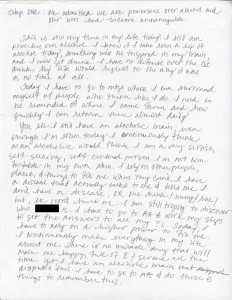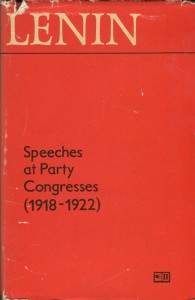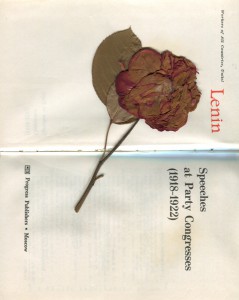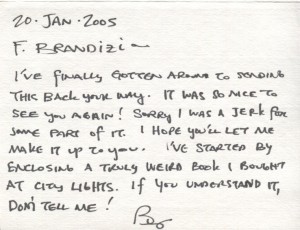Mr Oddbooks and I had a moment at a recent book sale wherein we both agreed we needed to buy a specific book because of a letter he had found inside of it. It was a coffee table book about sailing vessels (Mr Oddbooks is ex-Navy and longs for the coast like I long for the desert and here we both are in Austin) and was not particularly unique – he already had many books similar to this one. But the letter inside pulled us to buy it. The letter seemed as important as the book, if not more important, and as long as this book remains in our collection, that letter will remain inside the book, just as we found it.
I realized how often we both do this – purchase a book because something left in the book calls to us. I’ve come to think of this tendency as “biblio-sentimentality.” I have no idea how many books we have currently that we acquired due to our combined biblio-sentimentality, but I think I am going to record some of them here. I have to think others are like this, buying books because they feel an emotional connection to them due to marks and items left in the book. Perhaps others will enjoy seeing these books. Perhaps this is just more of my extremely indulgent blogging style. If so, no harm, but I can say that I would love to see any books you fine readers may have that you purchased due to biblio-sentimentality. Feel free to include pictures in comments!
I divide biblio-sentimentality into three categories: inscriptions, marginalia, and ephemera. Inscriptions, of course, are messages to a gift recipient or from the author, written generally on a title page, but could be included somewhere else in the book. Marginalia refers to notes about the text written in the blank margins of books, but it can also include highlighting or underscoring text. Ephemera refers to items found in the book that were not meant to be permanently left in the book, like letters, cards, bookmarks and similar.
In this entry I’m going to share some of our examples of biblio-sentimental ephemera, since this discussion was inspired by the sailing vessel book with the letter in it, and it seems fitting that I should begin with that book.
 Mr Oddbooks found this at a huge Half-Price Books warehouse sale. He really does have dozens of similar books but when the letter fell out of this book, he immediately read it and then put the book in our cart.
Mr Oddbooks found this at a huge Half-Price Books warehouse sale. He really does have dozens of similar books but when the letter fell out of this book, he immediately read it and then put the book in our cart.
 A woman fighting for sobriety left this letter to herself in a coffee table book about sailing ships. Though it is unlikely anyone would be able to identify her through this letter, I redacted her name anyway. This was a rescue ephemera – this letter seems very important to me, a woman with my own addiction demons. It was unusual that this woman placed this letter in such a book – was she using the book as a make-shift lap desk? Did she think this large book was the best place to keep such a letter since huge books about sailing vessels aren’t usually the types of books most read in the average home?
A woman fighting for sobriety left this letter to herself in a coffee table book about sailing ships. Though it is unlikely anyone would be able to identify her through this letter, I redacted her name anyway. This was a rescue ephemera – this letter seems very important to me, a woman with my own addiction demons. It was unusual that this woman placed this letter in such a book – was she using the book as a make-shift lap desk? Did she think this large book was the best place to keep such a letter since huge books about sailing vessels aren’t usually the types of books most read in the average home?
It worries me that she forgot about the letter in this book, or that there is a worse reason that this letter was left behind in a book, like she lost her possessions in an eviction. Or maybe she worked the steps and is clean and has no need to remember this letter. Regardless, it seemed callous to both of us to leave this book with this letter behind. It needed to be saved and kept. It seems very important to me even if I don’t know exactly why, outside of the shared experience of addiction.
The next example of book ephemera comes from Mr. Oddbooks’ collection. It technically isn’t ephemera, as such, because these items were clearly meant to be kept (though not necessarily in this book), but the strangeness forces me to include it just so I can talk about it.
 It is unusual for Mr Oddbooks and I to disagree on how we obtained a book. I have a very focused memory on where I purchased or how I received a book but so does Mr. Oddbooks. And though this is technically his book, it is a subject that I would read, if provoked.
It is unusual for Mr Oddbooks and I to disagree on how we obtained a book. I have a very focused memory on where I purchased or how I received a book but so does Mr. Oddbooks. And though this is technically his book, it is a subject that I would read, if provoked.
I think the book came into the house via a convoluted path. The brother of one of my mother’s coworkers died and left behind a substantial book collection. Much of it was uninteresting to me but because I was a “book” girl with an Amazon seller account, the brother asked me to look into selling some of the books, and I decided to give him market used price for the book once I discovered its contents. Mr Oddbooks insists he purchased this himself at a used book store and specifically bought it because of its contents.
 Regardless of who is correct, the fact remains that you don’t really expect to find pressed flowers in a copy of Lenin’s Speeches at Party Congress (1918-1922). There’s a second flower toward the middle of the book, but Mr Oddbooks forgot to scan it and I refuse to try because me using the scanner in his office is not unlike asking a dog to manage a particle accelerator (seriously, that fucking scanner…)
Regardless of who is correct, the fact remains that you don’t really expect to find pressed flowers in a copy of Lenin’s Speeches at Party Congress (1918-1922). There’s a second flower toward the middle of the book, but Mr Oddbooks forgot to scan it and I refuse to try because me using the scanner in his office is not unlike asking a dog to manage a particle accelerator (seriously, that fucking scanner…)
But these pressed flowers raise some questions. This book was published in the Soviet Union in the 1970s. Did the dead brother buy this book new and press flowers in it? Or did this book make its way from the USSR to the USA, pressed flowers making the trip as well. And in both cases, why on earth would anyone decide to press flowers in a relatively small and light book containing communist rhetoric? The OED is a far better book for squashing flowers. Readers, if you have any ideas, leave them in the comments. From Russia with oddness, indeed.
 My current favorite example of ephemera comes from Mykle Hansen’s Eyeheart Everything. I found this book in 2014 at an Austin used book store in the bargain section for a dollar. I didn’t even open the book before purchasing it – I was just so appalled that this particular book had been overlooked by so many that it was in the bargain section that I had to “rescue” it.
My current favorite example of ephemera comes from Mykle Hansen’s Eyeheart Everything. I found this book in 2014 at an Austin used book store in the bargain section for a dollar. I didn’t even open the book before purchasing it – I was just so appalled that this particular book had been overlooked by so many that it was in the bargain section that I had to “rescue” it.
 Once home I cracked the book open and found this pretty note card inside.
Once home I cracked the book open and found this pretty note card inside.
F. Brandizi –
I’ve finally gotten around to sending this back your way. It was so nice to see you again! Sorry I was a jerk for some part of it. I hope you’ll let me make it up to you. I’ve started by enclosing a truly weird book I bought at City Lights. If you understand it, don’t tell me!
B(undecipherable)
This particular bit of ephemera is wonderful. First, it permitted me to track the travel course of this used book. There are multiple City Lights Books throughout America, owned by different people, but when a person just says “City Lights” that generally means the location in San Francisco. So this book made its way from San Francisco to Austin, a path taken by many tech workers in the last decade or so. Second, this little card just made me happy – some dude was a prick to his friend and sent him an odd book as part of an apology. Even though B(undecipherable) perhaps really is a jerk, it’s hard not to appreciate the sentiment (although Mr Oddbooks pointed out that B(undecipherable) may be continuing his jerkishness by deliberately sending a book his friend may not understand).
My next entry on biblio-sentimentality will be on marginalia. One of my most treasured books contains beautiful notes from a woman I will never meet and the book was clearly so closely read by her that I wonder how she brought herself to part with it. I will definitely be discussing that book, as well as some other examples of marginalia.

This reminds me of two Things:
1.) A small hardback book my good friend sent me for xmas this year. It’s called “Dedicated To,” and it’s compiled by the person who runs this blog:
https://bookdedications.wordpress.com/
2.) When I was at college and working in a Library, I found a letter in a novel. I don’t remember what the book was, but the letter was written by a girl who was clearly trying not to lose a boy. She had typed it up on her PC and printed it out, signing it by hand, even though this was the 90s. It was full of really banal but sincere declarations of love. Amongst other things, she wrote that she now understood the lyric, “You are the bullet in my gun.” Because what use was a gun without a bullet? I found it really touching, espacially because it seemed she had been unsuccessful. The boy had clearly used it as a bookmark in a book he didn’t come close to finishing and after he returned the book to the Library he bprobably hadn’t noticed that the letter was gone. It just seemed full of pathos. I folded the letter and put it in my pocket, but then I thought better of it and put it back in the book, which I returned to the shelf.
There is something very fucked with Word Press at the moment because I just got notification for this comment. FEH!
Love that link. Until reddit shit the bed, I had read similar communities, especially one devoted to forgotten bookmarks. It’s comforting to me that others love this stuff as much as I do.
Ah, finding old love letters… I once had an ee cummings poetry collection that had one of the most heart-wrenching inscriptions ever printed in a book. A young man was desperately in love with a young woman named Amy and he pleaded with her to read the book before she ended their relationship. That I found the book in a used book store pretty much tells me how that ended up for him. I don’t have it anymore because a friend of mine borrowed it to read to a lover and never returned it. That relationship ended, too. I think the book has sad karma.
I think returning the letter to the book was the right thing to do. I don’t know if I can explain why I feel that way but it definitely seems like the right thing to do. I hope to have my next biblio-sentimentality entry up Monday, on marginalia. I often wonder if anyone ended up with my “nothingface” books, a weird little stick figure I used to draw in college texts. If so, I wonder what they thought of him. He was a symbol of absolute frustration – I hope that didn’t transfer to the new book owner like romantic bad luck did with that cummings book.